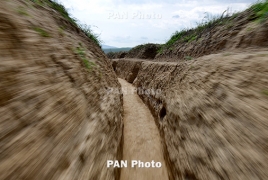Turkey admits its soldiers were killed in Karabakh August 11, 2023 - 11:10 AMT PanARMENIAN.Net - Turkish Foreign Minister Hakan Fidan, who previously headed the National Intelligence Organization (MIT) for 13 years, has admitted that Turkish soldiers died in the 44-day war unleashed by Azerbaijan against Nagorno-Karabakh (Artsakh) in 2020. Before a meeting of Turkey’s National Security Council (MGK), President Recep Tayyip Erdogan awarded Fidan with a medal for distinguished service for his work as deputy undersecretary and president of MIT. Upon receiving the award, Fidan stated that “I am receiving this medal on behalf of my friends, who were martyred in Libya, Karabakh, Syria, and Iraq to carry out your orders while serving with me,” RT reports. Fidan’s statement confirmed Turkey had been directly involved in the conflict, which cost thousands of servicemen and over a hundred civilians their lives. Suspicions of Ankara’s role in the Second Karabakh War stretch back to 2020, when a number of reports, as well as several US and French officials, implied Turkey had helped Azerbaijan prepare and instigate the conflict. Citing military and diplomatic sources, the Kommersant newspaper alleged that Ankara had helped Baku by supplying it with weapons and had even sent in fighters from Syria and Libya. Officially, the relationship between Ankara and Baku was limited to political support, as well as occasional joint military exercises. However, Kommersant’s report claims that only one month before the hostilities in Karabakh broke out, Turkey had deployed a large contingent of its forces to Azerbaijan, who ended up playing a key role in coordinating and planning offensive operations against Armenian positions in the region. The Karabakh war officially ended after Russia brokered a ceasefire between the two sides and sent in peacekeepers along the contact line to help maintain it. Since then, Ankara has also said it would assist with the peacekeeping mission and has positioned 60 soldiers to serve at a joint monitoring center. The Nagorno-Karabakh dispute dates back to 1988, when the ethnic Armenian majority region broke away from Azerbaijan, triggering an ethnic conflict that claimed thousands of lives before it was frozen by a 1994 truce. In 2020, fighting broke out once again in what is now called the Second Nagorno-Karabakh War. Despite Russia freezing the conflict with a ceasefire, the region has continued to see occasional flare-ups between the two neighbors. The foreign ministers of Armenia and Azerbaijan, Ararat Mirzoyan and Jeyhun Bayramov, have arrived in Washington. The CSTO budget for the current year requires adjustments due to the refusal of Yerevan to pay their share of contributions. Six total incidents have burned 19 old-growth trees. Friday night 8 trees were torched along the beautiful main entrance. The EU does not intend to conduct military exercises with Armenia, Lead Spokesperson for EU Foreign Affairs and Security Policy Peter Stano says. Partner news |